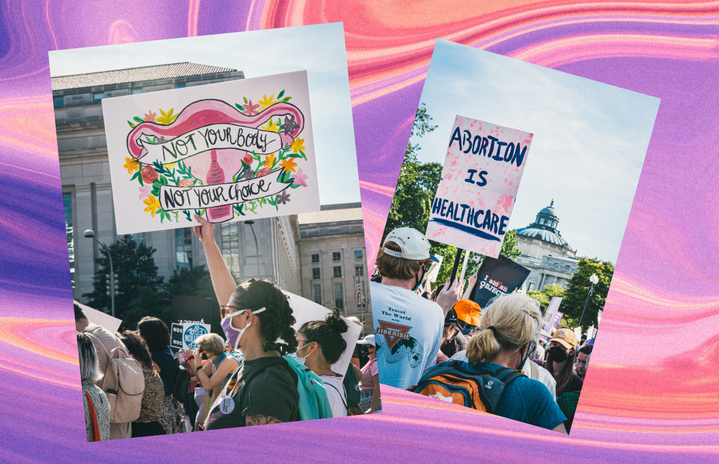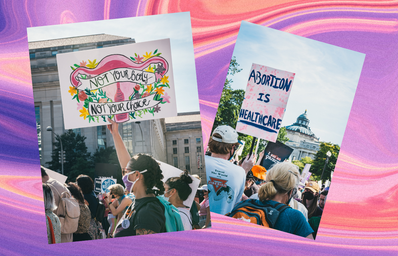Mallory found out she was pregnant at 19 while in a relationship with an abusive partner. Her abortion saved her from a physically dangerous relationship.
Donna was sexually and mentally abused by her stepfather from ages 8 to 17 and became pregnant at 15. As a young girl, Donna did not get to make a choice about having sex, but she did get the choice to have an abortion that would save her from further mental distress of carrying her abuser’s child.
Victoria was 25 and married when she found out she was pregnant but did not want a child at this point in her life. She had an abortion and at age 32 gave birth to her first child on her own terms. Access to a safe abortion let Victoria choose the trajectory of her life.
Leah had struggled with mental health her entire life. When she became pregnant, she knew she could not risk all the progress she had made with her mental health over the years. Her ability to have a protected abortion allowed Leah to put her mental health first.
Janet was living in Texas when she found out she was pregnant with twin girls through IVF after five lost pregnancies. While pregnant, Janet was diagnosed with sepsis. At 21 weeks, she went into labor, very sick from the sepsis in her bloodstream. In order to save Janet’s life, the doctors performed a dilation and curettage, providing her with a medical abortion. If the Texas Heartbeat Law had been in effect during this time, Janet would have died.
These are real stories from women in the United States, provided by Planned Parenthood. Each of their decisions to have an abortion was valid, as is any reason why an individual would choose to have an abortion. Without the choice to make this health care and personal decision, all of these women’s lives would be different today.
The U.S. grants freedom to its citizens to choose which religion they practice, to choose to own a gun, to choose to enlist in the military at the age of 18 and many more. However, the right of women to choose what to do with their bodies remains highly debated and is now more restricted than it has ever been in the past 50 years.
On June 24, 2022, the Supreme Court overturned Roe v Wade, the 1973 ruling which declared abortion to be a constitutional right. Now, nearly 50 years later, abortions in the U.S. will no longer be protected by the Constitution, leaving the decision to ban abortions at the state level. As a result, at least half of the states in the U.S. will make abortion illegal, according to The New York Times.
What does this mean for states?
There are 13 states that have trigger bans, which means that bans on abortions in these states will be triggered into effect with the Supreme Court decision. Some of these bans went into effect when the ruling was overturned, and the rest will likely go into effect within one month. There are seven states without trigger bans that are also likely to ban abortion within the next few weeks or months. 10 states remain uncertain, and in the remaining 18 states, abortion will most likely remain legal, according to The Washington Post, which is continuing to track changing laws among states.
Following the Supreme Court decision, West Coast states took action to create a safe haven for any individual seeking an abortion. The governors of California, Oregon and Washington will announce their Multi-State Commitment to protect reproductive health care and the right to choose, according to CA.gov.
The Supreme Court:
The Supreme Court’s decision to overturn Roe v Wade was not unanimous, resulting in a 6-3 ruling. In their joint dissent, the three justices – Stephen Breyer, Sonia Sotomayor and Elena Kagan – declared that the U.S. government has done American women an injustice with this decision, falling farther from equality.
“With sorrow — for this court, but more, for the many millions of American women who have today lost a fundamental constitutional protection — we dissent,” said the justices.
Six days after the Supreme Court’s decision to overturn Roe v Wade, Justice Breyer announced his retirement from the court. According to CNBC, he is set to be replaced by Ketanji Jackson Brown, a U.S. Court of Appeals judge.
The six judges who voted to take away this constitutional protection are Clarence Thomas, Brett Kavanaugh, Amy Coney Barrett, Neil Gorsuch, Samuel Alito and John Roberts. Although Chief Justice Roberts did not join the majority opinion, he did file an opinion in support of the majority decision. Three of the six judges, Kavanaugh, Barrett and Gorsuch, who voted to overturn the ruling were nominated by former President Trump, according to The New York Times.
The notorious backgrounds of the justices who voted to overturn the ruling have angered many individuals. Justices Thomas and Kavanaugh have both been accused of sexual harassment and assault on multiple accounts, meaning that one-third of the six men on the Supreme Court have been accused of sexual misconduct, according to Huff Post. Therefore, men accused of sexual assault by multiple women were allowed to make a decision about the reproductive right of every woman’s body in this country. By allowing this to occur, the U.S. government has greatly failed American women.
How did this occur? The life-altering Supreme Court decision to overturn Roe came from a past Supreme Court case. The case of Dobbs v Jackson Women’s Health Organization was another landmark decision made by the Supreme Court that made abortion a moral decision, meaning that the Consitution could not regulate abortions. This case addressed a 2018 Mississippi law banning abortions in the state at 15 weeks. This was a challenge to Roe v Wade which allows individuals to receive an abortion in all states before fetal viability, which is about 23 weeks.
Justice Alito’s decision in favor of overturning Roe v Wade used Dobbs v Jackson Women’s Health Organization through a legal philosophy known as “original intent.” This philosophy uses the language of one document to scrutinize the language of another document of contrary opinion. Therefore the Mississippi case allowed the court to reconsider Roe. In doing so, Justice Alito used original intent in the case of Dobbs v Jackson Women’s Health Organization to declare that fundamental rights to abortion were not the responsibility of the court, but instead left up to the decision of the states, overruling Roe v Wade, according to U.S. Supreme Court.
Responses and reactions:
President Biden responded to the Supreme Court decision, remarking it as a “solemn moment” for the court and that the U.S “ didn’t limit [the right to abortion]. They simply took it away. That’s never been done to a right so important to so many Americans,” said Biden. The president stated that Roe v Wade advocated basic principles of equality and the fundamental right to privacy, according to The White House.
“Now, with Roe gone, let’s be very clear: The health and life of women in this nation are now at risk,” said Biden.
The debate on abortion might be the greatest and most debated political divide in the nation, much due to the strong religious beliefs it brings up for those in favor of banning abortions. As predicted, the news of Roe v Wade being overturned led to immediate and strong reactions by both pro-life and pro-choice groups.
While pro-life groups celebrated the news, pro-choice groups found themselves in mourning and anger; both groups taking to the streets of major cities across the nation to voice their opinions. Pro-life advocates like Texas Governor Abbott exclaimed that the court’s decision will protect the “innocent unborn,” and pro-choice advocates like the president of Planned Parenthood, Alexis McGill Johnson, called the ruling “horrific” especially for minority groups, according to CNBC.
Yet the one voice lacking is American cisgender men. Men have the ability to change the opinions of other men on women’s rights, according to research done by The Washington Post. I could guarantee you that there are way more men that have benefitted from abortion access than there are fighting for abortion access to be protected right now. Abortion is not just a women’s issue, it affects everyone.
The decision to overturn Roe v Wade goes against the majority American opinion on abortion, according to a SCOTUS poll which showed that 62.3% of participants opposed overturning Roe v Wade, according to The New York Times. This shows the complicated relationship between the court and the people.
Future of other constitutional rights:
The overturning of Roe v Wade raises questions about the future of other constitutional rights and many fear that contraceptive access and gay marriage are at risk. The 1965 Griswold v Connecticut case gave married couples the right to contraceptives. If Griswold was overturned, conservative states would likely ban birth control like Plan B and IUDs. The 2015 Obergefell v Hodges case legalized gay marriage, which had been fought for decades. The 2003 Lawrence v Texas case declared that states could not criminalize same-sex sexual activity. After the Supreme Court announced its decision on Roe, Justice Thomas made comments saying Griswold, Lawrence and Obergefell should be revisited. Overturning these constitutional rights, along with Roe, goes against the right to privacy in this nation.
abortion is a fundamental human right:
We are now living in a time where our bodies are more regulated than a firearm in the U.S. As of 2020, gun violence is now the leading cause of death for American children, adolescents and young adults, according to the CDC. I would guess that it is very likely that a gunman walking into a school with a firearm has the ability to kill more children than a pregnant person could kill in their lifetime through abortions. If the Supreme Court’s decision to overturn Roe v Wade was about saving lives, they should protect their current youth against gun violence, instead of forcing individuals to have children they cannot protect.
Abortion is not only a human right, it is also health care. High-risk OB-GYN, Erika Werner, wrote that in the past 15 years, she has witnessed how pregnancy can put a life at risk at least once every month, revealing the hard truth that pregnancy can take lives, but abortions can save them. In fact, among developed nations, Americans are the most likely to die due to childbirth, according to The White House. Since the overturning of Roe, Werner explains that in many states today, providing medical abortion practices to save lives would be more challenging to achieve and take much longer to approve, furthering the risk of death for many women, according to WBUR.
Wealthy, white individuals will likely always have access to safe abortions. This decision to overturn Roe v Wade will affect minorities in the U.S. the most and could be seen as a war on minority women. Banning abortions will disproportionately impact women of color and low-income women, decreasing or eliminating their access to safe abortions.
Black women, among other women of color, have always faced barriers when it comes to reproductive healthcare, but now it will be worse than ever. In the U.S., Black women are four times as likely and Latina women are twice as likely to have an abortion compared to white women, according to the CDC. Black women are also three times as likely to die from pregnancy complications, according to The White House.
“There is no denying the fact that this is a direct attack on all women, and Black women stand to be disproportionately impacted by the court’s egregious assault on basic human rights,” said Janette McCarthy Wallace of the National Association for the Advancement of Colored People.
It is also extremely important to be aware of white feminism during this time. We must advocate for all individuals needing abortions and acknowledge and fight for how this decision disproportionately affects minority groups.
Being forced to go through with an unwanted pregnancy will also affect the mental health of the parent. Contrary to some beliefs, there is no psychological link between having an abortion and future mental health problems. However, there is evidence that those who have been denied an abortion face psychological harm. A landmark research study was conducted among 21 states with more than 1,000 participants that showed that those who had an abortion were not any more likely to report negative emotions and feelings of depression than those denied an abortion. Another study that looked at women who received medical abortions due to life-threatening pre-natal circumstances, found that these women faced less negative psychological distress than women who went through with their pregnancies and lost their newborn after birth or had a child with congenital disabilities, according to American Psychological Association.
Misconceptions about an abortion’s effect on mental health come from a lack of knowledge about abortions, according to Debra Mollen, Ph.D., a professor of counseling psychology. Lacking knowledge can lead to uneducated decisions.
final thoughts:
Our society is not built to support unplanned and unwanted pregnancies, especially for those not financially able to have a child. Unpaid maternity leave, no universal child care, lacking counseling for new parents, formula shortages, overcrowded foster care system, high rates of child abuse and neglect, and high rates of school shootings are not “pro-life.”
Banning abortions will trap pregnant individuals in abusive relationships, force victims of rape and incest to carry their assaulter’s child, force parents to drop out of school and put their careers on hold, put birthing people’s lives at risk and provide them no anatomical freedom. Banning abortions does not stop abortions, it will only stop safe abortions.
In these times, it is valid to be feeling overwhelmed, scared and angry. More than half of the nation just lost a fundamental human right. As a nation, we are going backward.
It is also important to note the timing of the Supreme Court’s decision. Their decision comes about five months before the midterm elections this November. They might be hoping that we forget about our anger over time and will have moved on to the next tragedy that strikes. However, now more than ever, it is extremely important to stay focused on the matters at hand and protect constitutional rights to privacy across the board. As of now, the Supreme Court has lit a fire under voters with their decision to take away protected abortion rights, but we must not let that fire burn out come November.
resources:
Online abortion pills: Plan C pills
Finding a safe clinic: I Need an A, Abortion Finder, National Abortion Federation
Medical hotline: Miscarriage and Abortion Hotline
Abortion counseling and emotional support: All-Options.org, Exhale ProVoice, Connect and Breathe
Abortion funding: Abortion Funds


